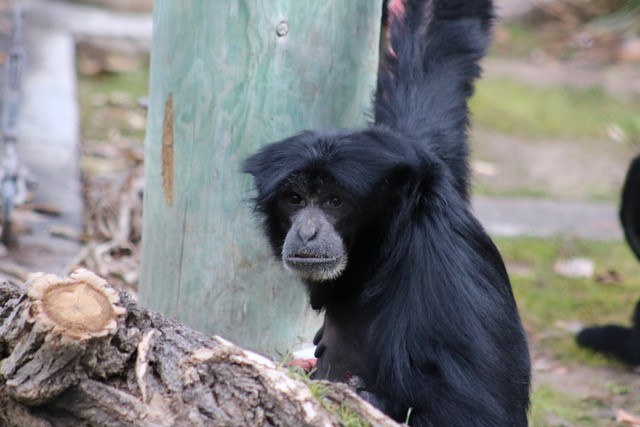
Johore the Siamang Dies from Shigella Complications
The ABQ BioPark continues to treat for the highly infectious bacteria, which can cause GI distress and death in primates.
Sept. 2, 2021 - On Tuesday, the ABQ BioPark lost its female siamang Johore, who died from complications of the Shigella bacteria that has been affecting the facility’s apes over the past few weeks.
Symptoms of Shigella infection include diarrhea, vomiting and abdominal cramping. While some apes had minor symptoms, others, like Johore, required more care. Staff said the 30-year-old siamang was receiving fluids and responding well to her treatments. On Sunday, her condition declined, and she succumbed to her illness on Tuesday, according to ABQ BioPark Senior Veterinarian Dr. Carol Bradford.
Johore was mother to 4-year-old Eerie and 2-month-old Rue. Johore was born at the Cheyenne Mountain Zoo and arrived at the ABQ BioPark in 2009. Here, she welcomed a total of five offspring with 32-year-old Brian, who also passed due to complications with the Shigella bacteria on August 16, 2021.
"Despite the incredible efforts of our animal care team, we lost another member of our BioPark family to this terrible illness," said ABQ BioPark Director Stephanie Stowell. "While this loss deeply affects us, our priority now shifts to the health of Johore's sons and doing everything we can do to eradicate Shigella from our facility as quickly as possible."
Infant siamang Rue is now receiving 24-hour care from the BioPark’s animal care team. Siamangs are highly social apes, so Rue and his human companions spend much of their time in the siamang building for visual contact and interaction with brother Eerie.
The BioPark’s care team prepared for the possibility of hand-raising Rue by introducing him to a bottle while Johore was sedated for treatments over the last week. Rue drinks formula well and gained 10 grams during his first night in human care.
The ABQ BioPark has extensive experience caring for primates who could not be raised by their mothers, but Rue’s condition is still of high concern. He and his brother Eerie are both experiencing symptoms of Shigella infection.
Currently, two chimpanzees—21-year-old female Rainey and 6-year-old male Desi—are showing symptoms similar to those of a Shigella infection. The BioPark is waiting for results from lab tests to confirm the cause of their illness. Those chimps remain indoors to be closely monitored by the animal care team.
The majority of the other apes are on the mend, with most of the orangutans and gorillas choosing to spend time in their outdoor habitats. Hasani, a male western lowland gorilla, is still under watch and treatment; he was previously showing severe symptoms but is making slow improvement. Jack, another male gorilla, is remaining indoors while caretakers observe his symptoms.
Shigella is extremely difficult to eradicate according to Bradford, who said the BioPark might be dealing with this outbreak for weeks or months to come. In fact, she said it could take up to a year to clear the environment and all animals of the bacteria. Animal care staff will continue quarantine procedures wearing full PPE including suits, booties, masks and gloves. They have added more specific and intense cleaning to our standard regimen to target the Shigella bacteria.
Shigellosis is much more infectious than many other bacteria-related illnesses, according to Bradford. It takes only 10 Shigella bacterium to make an animal sick; most infections require hundreds to thousands of bacteria to cause illness. While the apes are receiving appropriate antibiotics, the complexity of great apes’ gastrointestinal systems makes it difficult to quickly eliminate all of the bacteria from an animal’s body.
“This has been emotionally and physically exhausting for our dedicated primate keepers and veterinary staff, who are working overtime every single day to help our beloved apes recover,” Stowell said. “It’s frustrating this can’t be fixed faster, but our zookeepers are incredibly passionate about the health and welfare of the animals that they care for every day. They have put much of their grief on hold in order to provide the care these animals critically need.”
Staff from other departments are stepping up to assist the BioPark’s primate caretakers by helping with tasks like food preparation or providing nesting material. Grief counseling is also available for staff during this difficult time.
An updated FAQ with more information about this outbreak and what the ABQ BioPark is doing can be found here: https://www.cabq.gov/artsculture/biopark/news/statement-from-the-abq-biopark-concerning-apes
